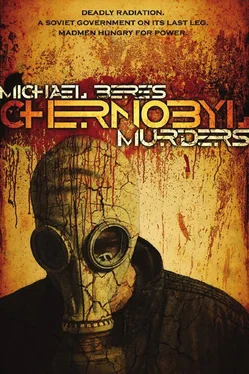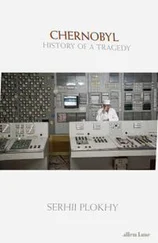Michael Beres - Chernobyl Murders
Здесь есть возможность читать онлайн «Michael Beres - Chernobyl Murders» весь текст электронной книги совершенно бесплатно (целиком полную версию без сокращений). В некоторых случаях можно слушать аудио, скачать через торрент в формате fb2 и присутствует краткое содержание. Жанр: Триллер, на английском языке. Описание произведения, (предисловие) а так же отзывы посетителей доступны на портале библиотеки ЛибКат.
- Название:Chernobyl Murders
- Автор:
- Жанр:
- Год:неизвестен
- ISBN:нет данных
- Рейтинг книги:4 / 5. Голосов: 1
-
Избранное:Добавить в избранное
- Отзывы:
-
Ваша оценка:
- 80
- 1
- 2
- 3
- 4
- 5
Chernobyl Murders: краткое содержание, описание и аннотация
Предлагаем к чтению аннотацию, описание, краткое содержание или предисловие (зависит от того, что написал сам автор книги «Chernobyl Murders»). Если вы не нашли необходимую информацию о книге — напишите в комментариях, мы постараемся отыскать её.
Chernobyl Murders — читать онлайн бесплатно полную книгу (весь текст) целиком
Ниже представлен текст книги, разбитый по страницам. Система сохранения места последней прочитанной страницы, позволяет с удобством читать онлайн бесплатно книгу «Chernobyl Murders», без необходимости каждый раз заново искать на чём Вы остановились. Поставьте закладку, и сможете в любой момент перейти на страницу, на которой закончили чтение.
Интервал:
Закладка:
Juli touched Lazlo’s chin, realizing how much he resembled Mihaly.
“You’re not such a tough guy, Laz.”
“What am I?”
“A Gypsy, like me. I’ve always wondered what it would have been like to live somewhere else, to be someone different. We can’t help it. It’s in our blood. It was in Mihaly’s blood.”
Lazlo lifted her hand from his chin, kissed her hand, stared at her. “Mihaly wasn’t attracted to a desire to try something new. He was attracted to you because you’re special.”
“How can you say that? I’m the one who initially thought of our affair as a game. I wasn’t married so who could get hurt? No, Laz.
Don’t call me special.”
“I’ll call you whatever I like,” he said in a deep voice.
They both laughed, pulling the heavy blankets over their heads so others would not hear them and wonder who would be insane enough to tell jokes in a situation like this.
Later in the morning, while Juli washed the tattered peasant clothes they managed to pick up along the way, officials arrived. She was behind a nearby house using a washtub set up for refugees. From where she stood, she could see a militia car pull up and three men get out. Two men in suits and a local uniformed militiaman. Juli stayed at the washtub, watching as Lazlo stood in line to speak with the men. Lazlo looked like any of the other farmers, his hands in the pockets of baggy trousers, his ill-fitting cap pulled down tightly on his head.
Because they had agreed not to panic, Juli stayed at the washtub. If Lazlo recognized any of the men, he would not have gotten in line.
One of the officials had a clipboard. When a refugee made it to the front of the line, the man would flip through pages on the clipboard and write something down. The procedure took only a minute or so for each. But when Lazlo got to the front of the line, the man with the clipboard kept flipping pages, Lazlo kept shrugging his shoulders, and the militiaman standing to the side stood closer. Finally Lazlo leaned forward, pointing at something on the clipboard and the questioning became more serious. They questioned Lazlo for several agonizing minutes. When he was finally allowed to leave, Juli hurried to the tent to join him.
Lazlo retrieved the sock in which he kept his money and his pistol from the hole dug in the ground through a slit in the tent floor.
He took the pistol out, checked the magazine, put the pistol in one pocket and the sock with the money in his other pocket, and turned to Juli.
“We’ve got to leave.”
“Do they know who we are?”
“Not yet. But I couldn’t convince them I was on the list. I tried mispronouncing a name to see if I could fake one, but they wanted family details. I guess you saw what happened when I tried to look at the list myself.”
“I thought they would arrest you.”
“I pushed them close to it. Soon they’ll report back about a man and wife named Zimyanin, a name not on the refugee list.”
“Where should we go?”
“I don’t know yet. There’s a bus due early tomorrow morning for those being shipped out. We’re supposed to stay here until the officials come back. If we get out of here tonight, or at least before morning, maybe they’ll think we got on the bus. We’ll spread the word we’ve been told to leave on the morning bus.”
Lazlo took off the hat he had worn, combed his hair, and put on a shirt with fewer holes in it. “I’ll be back as soon as I can. Get ready while I’m gone. I like your idea of posing as radiation technicians.”
“I’ll put things together.”
After Lazlo kissed her and left the tent, Juli looked out and watched him go. He walked quickly, one hand deep in the pocket where he had put the sock containing money saved during his years in the Kiev militia, the other hand deep in the other pocket where he had put his pistol.
Juli had gotten the idea to pose as radiation technicians when she saw technicians in lab coats while being bussed out of Kiev.
Creating makeshift lab coats out of bedsheets had taken three days.
The needles and thread and a pair of scissors were available at the village store. Although they were simply smocks rather than coats, it didn’t take much to look official in this region. Especially when she made a fake Geiger counter by taping an old radio tube from the local trash to a length of wire and inserting the other end of the wire into her black overnight case.
Juli removed the fake lab coats from the overnight case and spread them on the floor of the tent to get out the wrinkles. She took out a bottle of pink nail polish she had purchased at the village store and closed the overnight case. The smell of nail polish quickly filled the tent as she pulled out the brush connected to the cap. Juli did not polish her nails. Instead, she pulled the overnight case close and began filling in letters she had earlier outlined on the side of the case. The letters spelled out in Russian the words, danger, radioactive samples.
27
The sun was still well below the horizon, the gray dawn barely illuminating his office. It was deathly silent, no voices in the hall, no computer printer clattering outside the door. Komarov lit a cigarette, watching the dance of flame from his lighter. After closing the lighter, he inspected the cigarette’s tip. He thought of the shortness of life and the necessity to make the best of it while the glow still existed. Although he could not see the smoke, he saw a slight darkening of the slit of light shining beneath his office door. A shadow was there, and when he waved the smoke away, the shadow remained.
Three quick knocks on the door were soft and tentative. He waited a moment, then said, “Come in!” rather loudly.
Light from the hall swept across the office, and a sizable creature stood in the doorway.
“Are you here, Major Komarov?”
“I am, Captain Azef.”
“Why are you sitting in the dark?”
“I’m helping the state in this time of energy shortage, Captain. I was not in need of light at the moment, and one of our major generating plants is incapacitated. You can turn it on now.”
Despite the initial glare of the overhead light, Komarov kept his eyes open wide and watched as Azef sat across from him. Azef looked tentative, the initial darkness in the room putting him on the defensive.
Azef glanced at Komarov’s pistol and shoulder holster resting atop his desk, then looked to the window. “Still dark outside.”
“Never mind how dark it is, Captain. After days of silence, a twig has snapped in the forest. Yesterday a man without papers was interviewed at the Kopelovo collective to the west. Being without papers is not unusual, but he was with a younger woman he claims is his wife. The man said his name was Zimyanin. After interviewing him, officials on the scene questioned others about Zimyanin because the name was not on the refugee list. The questioning revealed Zimyanin is not a peasant but an educated man who speaks Russian, Ukrainian, and Hungarian. The man and his supposed wife fit the description of Detective Horvath and Juli Popovics.”
Komarov felt the heat rushing to his face and knew he would no longer be able to contain his anger. He finished in a loud voice after smashing his cigarette out in the ashtray.
“All of this was known to the Interior Ministry yesterday! And when am I told?” He looked at his watch. “A full sixteen hours after the fact! Shcherbina in the Zhitomir branch office learned about it and called me at home. Unfortunately he was not informed by phone. The ministry fools sent a note via the republic militia! The note didn’t reach Shcherbina until this morning when he arose for his morning exercise!”
Azef waited an appropriate few seconds to make sure Komarov’s tirade was finished. “What are you going to do, Major?”
Читать дальшеИнтервал:
Закладка:
Похожие книги на «Chernobyl Murders»
Представляем Вашему вниманию похожие книги на «Chernobyl Murders» списком для выбора. Мы отобрали схожую по названию и смыслу литературу в надежде предоставить читателям больше вариантов отыскать новые, интересные, ещё непрочитанные произведения.
Обсуждение, отзывы о книге «Chernobyl Murders» и просто собственные мнения читателей. Оставьте ваши комментарии, напишите, что Вы думаете о произведении, его смысле или главных героях. Укажите что конкретно понравилось, а что нет, и почему Вы так считаете.












